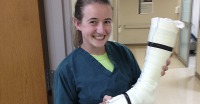NCCC Success Story
RIT / National Technical Institute for the Deaf / Experiential Learning / Success Stories / Spotlight
Natalie Snyder
Biomedical Sciences Double Minor - BS
Prosthetics & Orthotics/ Physical Therapy Intern

Hometown
Rockville, Maryland
Degree programs
B.S. Biomedical Sciences Double Minor: Psychology and Exercise Science
Year of graduation
2016
Place of employment
Walter Reed National Military Medical Center, Department of Defense, Bethesda, Maryland
Job Title
Intern under two different departments: Prosthetics and Orthotics, and Physical Therapy
Work Responsibilities
I interacted with and aided physicians, prosthetists, physical therapists, consultants and veterans to provide service to patients and families. Part of my job was to be mentored by prosthetists as I worked with them on making modifications to prosthetic limbs for patients. They would ask me how I would approach a new challenge, and I was able to apply the knowledge I learned from two years in a Biomedical Engineering major, in my Biomaterials Sciences, Biomechanics and Physics classes at RIT. Because of the very individual nature of each patient’s needs, I often was required to think outside the box. High-level problem solving was involved, and I learned and applied my knowledge of making a prosthetic limb or a socket, and was able to fit it to the individual patient. I also interacted with other interns and physical therapists, met with patients and their families and observed their activity and mobility growth. The veterans and their families are amazing and inspiring. I felt very privileged to have met and worked with them while on co-op.
How my career relates to my degree from RIT/NTID
Building a prosthetic limb for an amputee is a lot of hands-on work, so I took two significant courses in advance in preparation for that experience—Biomaterials Sciences and Musculoskeletal Biomechanics. Those courses helped me understand why we used the materials we did, like why we used carbon fiber instead of plastic, and aluminum instead of iron, to build the prosthesis and why we had to construct it the way we did. The physical therapy side of my co-op was interrelated with the Psychology and Exercise Science courses I took and currently am taking at RIT. Because I had the Exercise Physiology course, I understood why the physical therapists were prescribing specific exercises for patients. The interpersonal side of this job, relating to patients and other professionals, really has to do with your personal skills. You need to be open-minded, attentive and motivated to have really good and clear conversations with people. I practiced those skills even more during my co-op, and it made me more confident when I had to talk to strangers. Because of my experiences on co-op and changing my major from Biomedical Engineering to Biomedical Sciences, I now am passionate about becoming a physical therapist. To become a Doctor of Physical Therapy (DPT) is my next milestone, and I’m hoping to start a program in fall 2016. The problem solving skills and critical thinking I learned at RIT prepared me perfectly for this experience. I am confident now that I have the skills I need to be successful in the future.
Advice
Start early and find some connections, then reach out to those people to start with an observation or shadowing experience. If you like it, follow up and ask for details about working with them, and because you have shadowed or observed them, they already will know who you are and that will make it easier. After my observation, I knew I wanted to have a co-op there the following year, so I contacted the people I had observed and said I’d be interested in working with them for my co-op. They already knew me from the observation I had done, and during winter break I had an interview and got the job.




